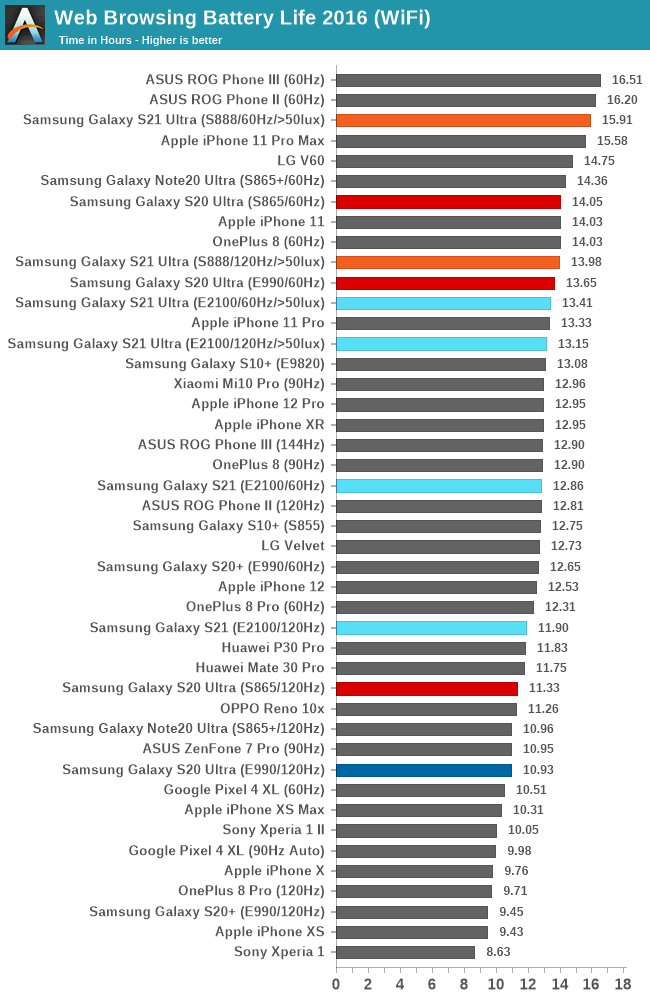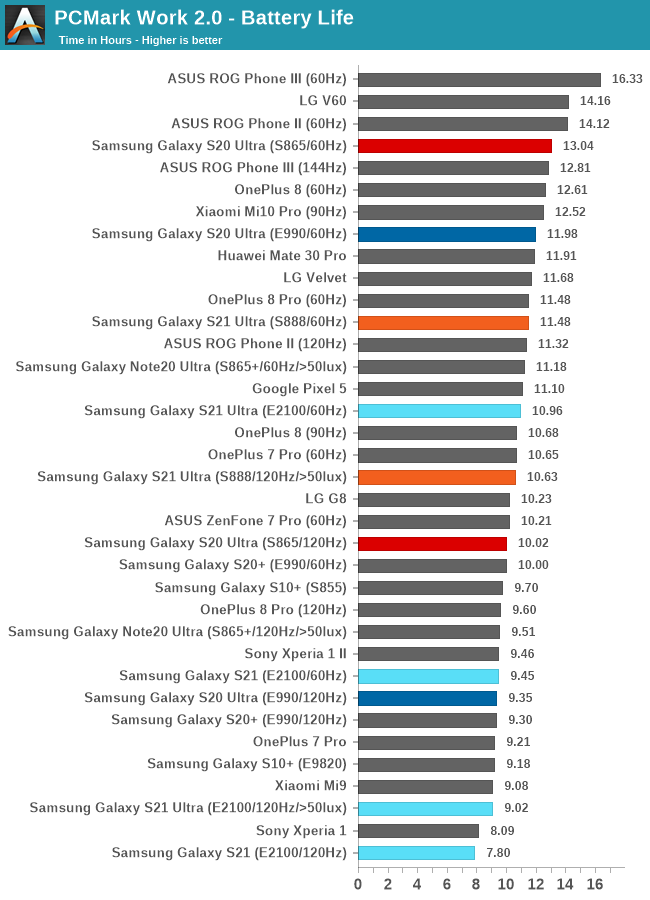The Samsung Galaxy S21 Ultra & S21 Review: The Near Perfect and The Different
by Andrei Frumusanu on February 22, 2021 12:00 PM EST- Posted in
- Smartphones
- Samsung
- Mobile
- Galaxy S21
- Galaxy S21 Ultra
Battery Life - Actually Great
Battery life of the S21 series is interesting as there’s two opposing factors that come into play. We’ve seen that this generation of SoCs are actually less energy efficient than last year’s iterations during interactive workloads. This comes at the benefit of higher performance, but generally it’s accurate that the new chips use more power. On the other hand, we also have more efficient displays, and high-refresh-rate operating modes.
On the Galaxy S21 Ultra, both software and hardware adaptive frequency work on a frame basis, allowing it the maximum power efficiency benefits even during 120Hz operation. Together with the much more luminance efficient screen, we should be looking at outstanding battery efficiency.
The regular S21 is more interesting as we hadn’t had the opportunity to see Samsung’s adaptive refresh mode on a display which doesn’t support hardware LFD. Here, the mode switching between 120Hz and 60Hz is on a coarser software level – the display will switch to 60Hz on static screens, but only after around a second of inactivity. That’s actually still great for power efficiency compared to the constant 120Hz of the S20 series, which means that in general every-day scroll-and-read behaviour, the 120Hz mode of the S21 and S21+ should still be much more efficient than their predecessors.

In our web-browsing test, the results here are slightly different to our provisional test results we had published a few weeks ago- notably on the 120Hz runs.
Nevertheless, the results for the S21 Ultra are outstanding. Even though in theory the SoC is more power hungry, the new display is so much more efficient, that we’re seeing the S21 Ultra takes a large lead of 13% at 60Hz for the Snapdragon variant. The generational differences for the Exynos variants here is much smaller due to how more much responsive and aggressive the new SoC is, which mostly counteracts the new luminosity efficiency of the screen.
In 120Hz mode, the new Ultra devices both take massive leaps over their predecessors- showcasing the new adaptive frequency and LFD mechanisms and how they make 120Hz viable in every-day usage.
Even the smaller S21, the software based adaptive refresh helps a lot as the shift from 60Hz to 120Hz now only costs around 8% in battery life, whereas last year on the S20+ it had a +25% impact.
People will notice the Snapdragon S21 Ultra has a larger delta between its 60 and 120Hz modes, and I think that’s because for some reason the Snapdragon 888 behaves much less aggressive in its 60Hz setting, while the Exynos S21 is tuned to be equally responsive regardless of refresh rate, which is a software discrepancy between the two phones.

Overall Battery Life: Great
In general, the S21 Ultra’s battery life is just fantastic thanks to the new generation display and its heightened power efficiency. The advantages here will vary depending on how you use it – if you tend to use it in dim environments at lower brightness, you might not see the improvements as much as if you’re in a bright scenario and tend to use your phone at high brightness levels. The brighter it will be, the better the S21 Ultra will fare. In super bright scenarios, the phone will be unmatched.
For the S21, and likely applicable to the S21+ as well, battery life is also great. While not as powerful as the Ultra’s adaptive refresh mechanisms, the new software-based implementation on the S21 means that 120Hz is also a very viable option this generation.
While we’re seeing battery life this generation still favour the Snapdragon chips, the Exynos this year isn’t all that far behind, and given the general user experience equality between the two phones, it’s not a major point of contention anymore.










122 Comments
View All Comments
Andrei Frumusanu - Monday, February 22, 2021 - link
It's not, the software rendering part is extremely minor and has never had any significant impact on battery life.snowdrop - Monday, February 22, 2021 - link
So s21/s21+ > s21u for camera experience and s888 > e2100 for image quality. This strongly implies that the s21/s21+ with s888 would offer the best overall camera implementation of all the variants, but unfortunately this combination isn't featured in the article.Any hope of adding some shots from a s21/s21+ with s888 to the comparison?
Andrei Frumusanu - Monday, February 22, 2021 - link
The SD888 isn't definitive in having the better image quality.And no, I'm in Europe so getting Snapdragon Galaxies is hard, I have no plans to further attempt anything beyond the S21U.
snowdrop - Tuesday, February 23, 2021 - link
To me the s888 ultra shots all looked notably better (sharper, better shadow / mid / highlight detail, improved lens correction) with the occasional exception of better highlight detail when the e2100 chose a darker exposure and the one shot where the s21u s888 wasn't in focus. The grass / foliage processing on the e2100 is particularly terrible so it could just be that the scenes you chose exaggerated the e2100's weak spots.It looks like samsung used the stock qualcomm image processing stack for s888 models and is testing beta internal software on the e2100 ones.
I enjoy your excellent commentary on the computational photography capabilities of phone camera systems in your phone reviews. Have you considered including supplementary commentary from someone who has done dslr / lens reviews though to add a more photographer centric perspective though?
s.yu - Wednesday, February 24, 2021 - link
Uh pretty much from the first sample the Exynos was doing better, far better texture, though the SD caught up in a few subsequent samples, so this generation I say the processing is too close to call. Generally the SD variants had a better track record though.JoeDuarte - Monday, February 22, 2021 - link
Can anyone confirm whether the S21 with the Snapdragon has dual frequency GPS? Sorry if I missed it in the article. Dual frequency GPS is supposed to yield a huge accuracy boost, and maybe time to positioning too.JoeDuarte - Monday, February 22, 2021 - link
All the benchmark graphs are missing the S21, but Andrei is talking as though they include the S21. The graphs only show variations of the S21 Ultra, not the regular S21. Can we get the S21 results included?JoeDuarte - Monday, February 22, 2021 - link
Does Arm plan to succeed the A55 low power cores with a credible upgrade? Experts here have talked about this before, how the A55 is hopelessly outclassed by several generations of Apple low power counterparts at this point. Why have they iterated the A7x cores but not the A5x?Does anyone have insight into why Samsung's SoCs are so bad? It doesn't make sense for a company that owns the fabs, gets to develop the process nodes, and design the SoCs to be so far behind, spanning maybe a decade now. Is there no advantage, no synergies or co-optimization opportunities, in such complete vertical integration? It's supposed to be an advantage for Apple to design its own SoCs and cores. Why is it not an advantage for Samsung to do that and to*also* have the fabs and node development? Is there a talent issue? I wonder if maybe there just aren't enough engineers operating at the necessary level of skill to populate all these companies. The actual human cognitive science of how these teams do what they do is a black box, and apparently TSMC and Apple are able to do things that Samsung, Intel, and GF are not, and the difference is surprising.
nandnandnand - Thursday, February 25, 2021 - link
I think the Cortex-R82 points to further improvements to the efficiency cores being possible. Or Apple's own take on efficiency cores.Maybe we'll find out about an A55 successor within the next few months, before TSMC 3nm kicks off.
nandnandnand - Thursday, February 25, 2021 - link
Also, I think the "Helios" Neoverse E1 is better than A55, even discounting its SMT capability.